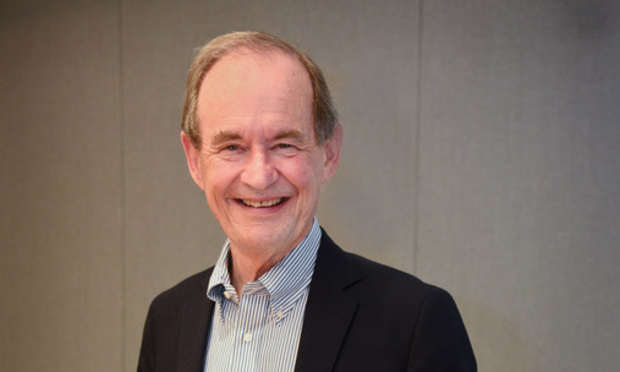Boies Responds to Criticism Over Role in Weinstein's 'Army of Spies'
David Boies is facing a backlash over his work for Harvey Weinstein, including questions about potential conflicts.
November 07, 2017 at 11:32 AM
7 minute read
 David Boies
David Boies
Photo: Rick Kopstein/ALM
Update: In a lengthy statement addressed to his firm on Tuesday, David Boies said that Harvey Weinstein is no longer a client and that he “would never knowingly participate in an effort to intimidate or silence women or anyone else.” Boies' full statement is appended below.
Criticism escalated Tuesday against star litigator David Boies after The New Yorker reported that the Boies Schiller Flexner chairman, a longtime legal adviser to Harvey Weinstein, contracted with former Israeli Mossad agents to derail the publication of a New York Times article about Weinstein's alleged predatory conduct with women.
Boies signed a July 2017 contract with an Israeli private intelligence agency called Black Cube as part of his efforts to protect Weinstein's reputation while his firm was separately representing the Times in a libel case, The New Yorker reported. Boies was also involved in Weinstein's relationship with PSOPS, another investigative firm, the magazine said.
Reaction from The New York Times was swift.
“We learned today that the law firm of Boies Schiller and Flexner secretly worked to stop our reporting on Harvey Weinstein at the same time as the firm's lawyers were representing us in other matters. We consider this intolerable conduct, a grave betrayal of trust, and a breach of the basic professional standards that all lawyers are required to observe. It is inexcusable and we will be pursuing appropriate remedies,” the paper said in a statement late Monday.
On Twitter, Boies fared poorly too.
“You're David Boies. Your obituary will say you helped extend marriage rights to millions. This is what you do next?” said one tweet from a senior editor from The Atlantic.
In comments included in the The New Yorker article, titled “Harvey Weinstein's Army of Spies,” Boies said: “We should not have been contracting with and paying investigators that we did not select and direct. At the time, it seemed a reasonable accommodation for a client, but it was not thought through, and that was my mistake. It was a mistake at the time.”
Boies, whose own film finance venture has done business with The Weinstein Co., earlier this fall described for The American Lawyer what his role would and wouldn't entail in representing Weinstein.
He said that he wouldn't be helping Charles Harder of Beverly Hills-based Harder Mirell & Abrams, who at the time threatened a $50 million suit against the Times over its report alleging that Weinstein for years sought sexual favors from actresses, sometimes in workplace settings.
Since then, Weinstein terminated his relationship with Harder and the libel suit was never filed.
Boies also said his role would not be to address “the subject matter of various news stories” published since The Times' initial article detailing sexual harassment allegations against Weinstein, including The New Yorker's bombshell report that included rape allegations.
Weinstein has denied those new allegations, specifically stating he has not engaged in sex that was not consensual.
Boies, his firm and his film finance company, Boies/Schiller Film Group (BSFG), have multiple other ties to Weinstein, his brother Robert Weinstein (now head of The Weinstein Co.) and the company itself. BSFG has co-produced movies with TWC, such as “Jane Got a Gun,” a 2015 film starring Natalie Portman, and “Gold,” a 2016 film starring Matthew McConaughey.
Boies and his partners Charles Fox Miller and Theodore “Ted” Uno, both of whom are family lawyers that litigate divorces, represented Robert Weinstein, now separated from his ex-wife. Boies also represented Harvey Weinstein during his dispute with board members of a nonprofit aids research organization, which led to allegations that the film producer had used $600,000 in charitable contributions for commercial purposes.
On Tuesday a spokesman for Boies Schiller Flexner forwarded the following statement from David Boies to all employees of his firm:
Many of you have asked for clarification of my, and the Firm's, role related to Harvey Weinstein and recent stories concerning the hiring of private investigators. You are entitled to clarification and it is important to me to make clear what happened.
Mr. Weinstein was a client of mine; he is no longer a client of mine or of the Firm.
In the first half of this year, Mr. Weinstein learned that the New York Times was considering publishing a story alleging that many years ago Mr. Weinstein had raped an actress. Mr. Weinstein hotly disputed that allegation.
I told Mr. Weinstein at that time that neither I nor the Firm would represent him in this matter, and he hired several other lawyers to represent him.
I also told Mr. Weinstein that the Times story could not be stopped through threats or influence; the only way that the story could be stopped was by proving it was not true.
Mr. Weinstein, together with the lawyers representing him, selected private investigators to assist him and drafted a contract. He asked me to execute the contract on his behalf. I was told at the time that the purposes of hiring the private investigators were to ascertain exactly what the actress was accusing Mr. Weinstein of having done, and when, and to try to find facts that would prove the charge to be false and thereby stop the story.
I did not (nor did the firm) select the investigators (at least one of which had been used by Mr. Weinstein previously) or direct their work; that was done by Mr. Weinstein and his other counsel.
While I told Mr. Weinstein that I was not in a position to represent him on these issues, his request to contract with investigators seemed at the time, like a reasonable accommodation for a longtime client. I regret having done this. It was a mistake to contract with, and pay on behalf of a client, investigators who we did not select and did not control. It was not thought through, and that was my mistake. I take responsibility for that.
I also want to address the issue of whether there was a conflict of interest with the Firm's representation of the New York Times. First, when we were engaged by the Times we made clear that we needed to be able to continue to represent clients adverse to the Times on matters unrelated to the work we were doing for the Times. Our Engagement Letter, countersigned by the Times, expressly states:
“We have explained and you have agreed that as a result of the types of clients the Firm advises and the types of engagements in which we are involved, we may be requested to act for other persons on matters which are not substantially related to the Engagement, where the interests of the other persons, and the Firm's representation of them, may be against the client's, including adversity in litigation.”
Second, despite the language in our Engagement Letter, I told Mr. Weinstein that we would not represent him in this matter.
Third, because I perceived the investigators' work as trying to ascertain the exact charges against Mr. Weinstein and to develop facts that would prove the charges untrue, I thought at the time that was an appropriate endeavor.
Had I known at the time that this contract would have been used for the services that I now understand it was used for, I would never have signed it or been associated in any way with this effort. I have devoted much of my professional career to helping give voice to people who would otherwise not be heard and to protecting the rights of women and others subjection to oppression. I would never knowingly participate in an effort to intimidate or silence women or anyone else, including the conduct described in the New Yorker article. That is not who I am.
If any of you have further questions, please let me know and I will try to address them.
This content has been archived. It is available through our partners, LexisNexis® and Bloomberg Law.
To view this content, please continue to their sites.
Not a Lexis Subscriber?
Subscribe Now
Not a Bloomberg Law Subscriber?
Subscribe Now
NOT FOR REPRINT
© 2025 ALM Global, LLC, All Rights Reserved. Request academic re-use from www.copyright.com. All other uses, submit a request to [email protected]. For more information visit Asset & Logo Licensing.
You Might Like
View All
Wachtell Helps Miami Dolphins Secure One of NFL’s First Private Equity Deals
3 minute read
'It Refreshes Me': King & Spalding Privacy Leader Doubles as Equestrian Champ
5 minute readTrending Stories
- 1Uber Files RICO Suit Against Plaintiff-Side Firms Alleging Fraudulent Injury Claims
- 2The Law Firm Disrupted: Scrutinizing the Elephant More Than the Mouse
- 3Inherent Diminished Value Damages Unavailable to 3rd-Party Claimants, Court Says
- 4Pa. Defense Firm Sued by Client Over Ex-Eagles Player's $43.5M Med Mal Win
- 5Losses Mount at Morris Manning, but Departing Ex-Chair Stays Bullish About His Old Firm's Future
Who Got The Work
J. Brugh Lower of Gibbons has entered an appearance for industrial equipment supplier Devco Corporation in a pending trademark infringement lawsuit. The suit, accusing the defendant of selling knock-off Graco products, was filed Dec. 18 in New Jersey District Court by Rivkin Radler on behalf of Graco Inc. and Graco Minnesota. The case, assigned to U.S. District Judge Zahid N. Quraishi, is 3:24-cv-11294, Graco Inc. et al v. Devco Corporation.
Who Got The Work
Rebecca Maller-Stein and Kent A. Yalowitz of Arnold & Porter Kaye Scholer have entered their appearances for Hanaco Venture Capital and its executives, Lior Prosor and David Frankel, in a pending securities lawsuit. The action, filed on Dec. 24 in New York Southern District Court by Zell, Aron & Co. on behalf of Goldeneye Advisors, accuses the defendants of negligently and fraudulently managing the plaintiff's $1 million investment. The case, assigned to U.S. District Judge Vernon S. Broderick, is 1:24-cv-09918, Goldeneye Advisors, LLC v. Hanaco Venture Capital, Ltd. et al.
Who Got The Work
Attorneys from A&O Shearman has stepped in as defense counsel for Toronto-Dominion Bank and other defendants in a pending securities class action. The suit, filed Dec. 11 in New York Southern District Court by Bleichmar Fonti & Auld, accuses the defendants of concealing the bank's 'pervasive' deficiencies in regards to its compliance with the Bank Secrecy Act and the quality of its anti-money laundering controls. The case, assigned to U.S. District Judge Arun Subramanian, is 1:24-cv-09445, Gonzalez v. The Toronto-Dominion Bank et al.
Who Got The Work
Crown Castle International, a Pennsylvania company providing shared communications infrastructure, has turned to Luke D. Wolf of Gordon Rees Scully Mansukhani to fend off a pending breach-of-contract lawsuit. The court action, filed Nov. 25 in Michigan Eastern District Court by Hooper Hathaway PC on behalf of The Town Residences LLC, accuses Crown Castle of failing to transfer approximately $30,000 in utility payments from T-Mobile in breach of a roof-top lease and assignment agreement. The case, assigned to U.S. District Judge Susan K. Declercq, is 2:24-cv-13131, The Town Residences LLC v. T-Mobile US, Inc. et al.
Who Got The Work
Wilfred P. Coronato and Daniel M. Schwartz of McCarter & English have stepped in as defense counsel to Electrolux Home Products Inc. in a pending product liability lawsuit. The court action, filed Nov. 26 in New York Eastern District Court by Poulos Lopiccolo PC and Nagel Rice LLP on behalf of David Stern, alleges that the defendant's refrigerators’ drawers and shelving repeatedly break and fall apart within months after purchase. The case, assigned to U.S. District Judge Joan M. Azrack, is 2:24-cv-08204, Stern v. Electrolux Home Products, Inc.
Featured Firms
Law Offices of Gary Martin Hays & Associates, P.C.
(470) 294-1674
Law Offices of Mark E. Salomone
(857) 444-6468
Smith & Hassler
(713) 739-1250












